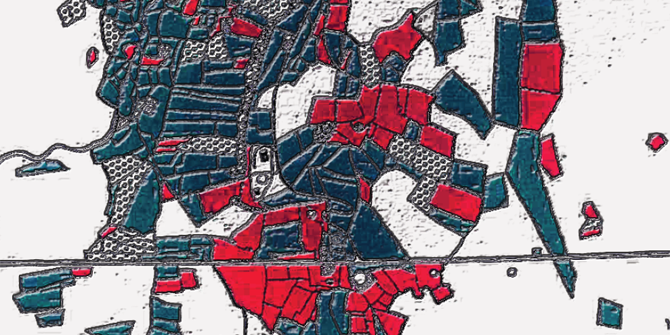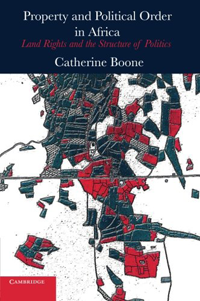
Professor Catherine Boone’s latest book, ‘Property and Political Order in Africa,’ has won the American Political Science Association’s ‘Gregory Luebbert Book Award’ for the best book in Comparative Politics published in the last two years. She tells us about the book and her ongoing research.
Catherine Boone has won ‘The 2016 Luebbert Book Award’ for her latest book ‘Property and Political Order in Africa: Land Rights and the Structure of Politics’. The prestigious award is given by the American Political Science Association (APSA) for the Best Book in Comparative Politics published in the last two years.
The book has been widely recognized for its contributions to the field of comparative politics, also winning APSA’s African Politics Conference Group Best Book Award 2014, receiving an Honourable Mention for the African Studies Association’s 2015 Herskovits Best Book Award, and gaining praise from experts in the field.
“This is a wide-ranging and deeply researched book… exhibiting a clear mastery of conflicts that have caught the world’s attention: the Ivory Coast, Kenya, Rwanda, the eastern Congo. It promises to become a classic in our field.”
Robert H. Bates, Eaton Professor in the Department of Government at Harvard
“A work of the deepest and broadest theoretical engagement, Property and Political Order in Africa makes it impossible to keep interpreting Africa’s rural conflicts as a product of state weakness or absence. It is the rules the state makes that make conflict play out how it does.”
Daniel Slater, Dept. of Political Science, Univerity of Chicago, Chair, Luebbert Award Committee
We spoke to Professor Boone to find out more about the book and how it fits into her ongoing research in the LSE Department of Government.
What is your position at LSE and what’s your area of research?
I joined the LSE in 2013 as Professor of Comparative Politics in the Departments of Government and International Development. My area of research is comparative political economy, which involves identifying connections between “political” and “economic” that can be invisible to scholars who employ analytic models that separate these two realms. In my recent work, I combine these two by exploring ways in which economic institutions, including markets and property rights in land, structure political interests, political competition, and patterns of political conflict in African countries.
This kind of work is especially exciting and challenging to do in Africa precisely because much existing political science argues or assumes that in African countries, economic (and political) institutions are weak or non-existent. In fact, many theories assume, implicitly or even explicitly, that rural Africa is almost an institutionless void where the forces of culture and coercion rush in to fill the vacuum. Given that 60-90% of the population in almost all African countries lives in the countryside, prevailing ideas about institutionlessness make it virtually impossible to understand very basic questions about “rule and revenue” in African countries. How is rural Africa governed? How are populations linked to states? How can we explain observed patterns of political order and disorder in African countries?
What is ‘Property and Political Order in Africa’ about?
Property and Political Order in Africa argues that the key institution that links state and subjects in most of rural Africa is property institutions – land control and ownership institutions. I develop an institutionalist analysis of rural land tenure regimes that shows how they have been built by modern states, and how they vary across subnational regions in African countries. Most of the book uses structured comparisons across about 30 subnational regions to argue that variation in land regimes produces discernable effects across a wide range of outcomes that are of great interest to Political Science – variations in patterns of conflict around land, in forms of political mobilization in elections (and civil war), in patterns of identify formation and the salience of ethnicity, and in the character of linkages between individuals, communities, and the state.
What is the book’s contribution to the wider field of Comparative Politics?
One thing I like about this study is that it shows that the kind of institutionalist analysis that prevails in comparative political economy studies of the OECD countries (focusing on variation in labor market institutions to explain different pressures for welfare state reform, for example) is also applicable in African countries. We just need to know what institutions to look for in African countries, and to have theory and evidence about how they vary and the political effects they can produce. In this sense, I see my most recent book as clearing the path for much new research on African Political Economy.
How does Property and Political Order in Africa relate to your previous books?
It’s my third book in the Cambridge Studies in Comparative Politics Series, CUP’s flagship series in comparative politics. The other two, Political Topographies of the African State (2003), and Merchant Capital and the Roots of State Power in Senegal (1993), also won book awards from the American Political Science Association, the African Studies Association, and the Society for Comparative Research (Mattei Dogan Book Award). All three leverage political and economic geography, and political-institutional factors that vary across space, to explain unevenness in the structure and territorial reach of African states.
What are you hoping to explore in current and future research?
There are many arguments and hypotheses that can be explored, tested, and extended with new kinds of data, particularly spatial data and new kinds of field research. Currently I am running a pilot project at the LSE that uses geocoded data on population, endowment, and subnational boundaries to try to test several arguments that emerged from ‘Property and Political Order in Africa’. I have field research projects going in Kenya and Côte d’Ivoire that study land politics, and especially politics around land titling. The prediction from my book is that land titling will be politically destabilizing at the local level – I want to see if, where, and how this prediction holds up in ways that we can observe and track. Effects should show up around election time in particular. This kind of finding would connect immediately to many other strands of political science research on Africa.
 Property and Political Order in Africa: Land Rights and the Structure of Politics is available via Cambridge University Press.
Property and Political Order in Africa: Land Rights and the Structure of Politics is available via Cambridge University Press.
 Catherine Boone is Professor of Comparative Politics in the LSE Departments of Government and International Development. She is the convenor of the MSc in African Development at the LSE. She teaches DV435 (African Political Economy), and co-teaches GV517 (Comparative Political Economy) with Prof. David Soskice (GV). Her research focuses on African political economy and state-building. She chairs the Political Economy Section of the American Political Science Association (APSA), is co-chair of APSA’s Africa Initiative, and is past-president of the West African Research Association.
Catherine Boone is Professor of Comparative Politics in the LSE Departments of Government and International Development. She is the convenor of the MSc in African Development at the LSE. She teaches DV435 (African Political Economy), and co-teaches GV517 (Comparative Political Economy) with Prof. David Soskice (GV). Her research focuses on African political economy and state-building. She chairs the Political Economy Section of the American Political Science Association (APSA), is co-chair of APSA’s Africa Initiative, and is past-president of the West African Research Association.





